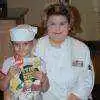-
Welcome to Celiac.com!
You have found your celiac tribe! Join us and ask questions in our forum, share your story, and connect with others.
-
Celiac.com Sponsor (A1):
Celiac.com Sponsor (A1-M):
-
Get Celiac.com Updates:Support Our Content
Wwyd? Negative - Of Course
-
Get Celiac.com Updates:Support Celiac.com:
-
Celiac.com Sponsor (A17):
Celiac.com Sponsor (A17):
Celiac.com Sponsors (A17-M):
-
Recent Activity
-
- Scott Adams replied to Joyes's topic in Post Diagnosis, Recovery & Treatment of Celiac Disease3
Test results
For someone with celiac disease who might have extreme villi damage the term "cross-reactivity" gets thrown around a lot. Many people with celiac disease, especially those who are in the 0-2 year range of their recovery, have additional food intolerance issues which could be temporary. To figure this out you may need to keep a food diary and do an... -
- Scott Adams replied to Brown42186's topic in Celiac Disease Pre-Diagnosis, Testing & Symptoms9
Help Understanding Test Results
This test was positive according to the original post, so the next normal step would be a biopsy: TTG IGG - 9 U/mL (0-5 range) @Brown42186 Here is more info about how to do a gluten challenge for a celiac disease blood panel, or for an endoscopy: and this recent study recommends 4-6 slices of wheat bread per day: -
- trents replied to Connie Smitj's topic in Coping with Celiac Disease5
Hunger, nervous stomach or Hpylori?
Connie, spinach is high in oxalates. Many celiacs do not tolerate oxalates well. If you are still battling dermatitis herpetiformis, you may want to look into a low iodine diet as well as reviewing possible sources of gluten cross contamination. -
- Scott Adams replied to Connie Smitj's topic in Coping with Celiac Disease5
Hunger, nervous stomach or Hpylori?
Do you eat outside your home, especially in restaurants, as this can be a source of cross-contamination. If you need to take dapsone still your diet may not be 100% gluten-free. This article has some detailed information on how to be 100% gluten-free, so it may be helpful (be sure to also read the comments section.): -
- Scott Adams commented on Scott Adams's article in Additional Concerns7
Is McDonald's Gluten-Free? A Complete Guide to Safe Menu Options (+Video)
In Europe I believe they also do not use the beef stock flavoring which contains hydrolyzed wheat in their French fry cooking oil.- burgers
- celiac disease
- (and 8 more)
-





Recommended Posts
Archived
This topic is now archived and is closed to further replies.